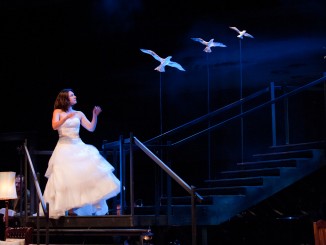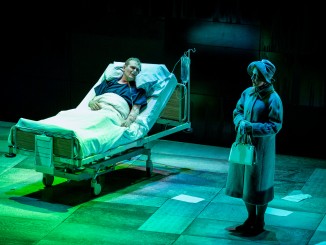You Can Be a Successful Woman, Too! (Terms and Conditions Apply) [by Rosabel Tan]

When people talk about women having careers, there’s a trade-off implied: You can’t have a career and a family – one will suffer if you try, and if you pursue the former, you’re defeminised: there’s something wrong with you or, at the very least, your womb.
Society has come far to ensure that this is a trade-off we can make, but it’s clear we have a long way to go and it’s this position that Silo explores in Caryl Churchill’s Top Girls. Divided into three acts, the play opens with Marlene (Danielle Cormack) celebrating her recent promotion to managing director with an eclectic and incredible bunch of women from history: There’s Isabella Bird (Bronwyn Bradley) a nineteenth century explorer and writer, Lady Nijo (Nancy Brunning), a thirteenth century concubine to the Japanese emperor, Dull Gret (Sophie Hambleton), the painted figure who led an army of women to Hell, Patient Griselda (Rachel Forman), whose obedience was the centre of many a fourteenth century tale, and Pope Joan (Rima Te Wiata), who rose to her seat by masquerading as a man.
The all-female ensemble cast work seamlessly together, and Rima Te Wiata is a highlight as Pope Joan, commanding a presence onstage that is powerful without being ostentatious. Rachel Forman as Patient Griselda demonstrates a complexity of character that embodies the dilemma each woman at the table faces: pride in their particular brand of success coupled with the devastating realisation of the price they paid to get there – which begs the question of what Marlene will pay for hers.
At times, I found the overlapping dinner party chatter in the first act frustrating – it didn’t add to the atmosphere of the occasion, though in an abstract way it highlighted each woman’s struggle to be heard in history. In the context of the play, I would rather have heard what they were saying – without being able to follow the conversation there wasn’t much to hold your attention. This was alleviated in part by Simon Coleman’s set design, which incorporated the simple yet remarkably effective use of a revolving stage. This allowed the audience to get a full view of each guest and, on another level, harked towards the cyclical nature of the challenges faced by each woman over the years. This was emphasised in the following acts, with new characters (played by the same actresses) echoed previous characters’ dilemmas.
These links are one of the most striking aspects of Churchill’s structure: more personal essay than traditional Aristotelian arc, it eases the audience into a mode of thinking without being didactic or heavy-handed. The dinner in the first act places into context the fact that we are celebrating Marlene’s promotion not only because it’s great news, but because it’s news that builds on the work of the women that came before her. The scope of the play then widens to a more natural environment – Britain in the 80s when Thatcher first rose to power – but our attention is primed towards the examination of gender politics, both at the work and in the home.
Although the workplace vignettes are a little one-dimensional, the introduction of Angie (Sophie Hambleton) – an awkward, angry sixteen year-old –adds a poignant layer to the discussion, exploring ideas of what it means to even be a woman; to dress as a woman and act like a woman. Hambleton is absolutely compelling in this role, her character evoking a difficult combination of repulsion, admiration and pity. But it’s Bronwyn Bradley’s Joyce that breaks your heart as Angie’s downtrodden caregiver and Marlene’s frustrated and resentful sister (this is where costume designer Elizabeth Whiting’s attention to detail really excited me – my eyes were constantly drawn to Joyce’s socks and sandals combo, which so perfectly embodied both her class and character).
Cormack ties the play together as Marlene, not only in story but in spirit – confidence underscored by vulnerability, she is every successful woman, which is exactly the problem since she’s got the balls but she also has the ovaries. The tense final showdown between Joyce and Marlene deals with this issue, and shifts the emphasis of the play towards the more complex and interesting distinction between a liberated woman and a feminist.
It’s a testament to the play that all I wanted to do after watching it was talk about the ideas it explored and what it means to be a feminist. Given – among other issues – Tui’s recent ads (the morning after watching the play I noticed their offensive motorway billboard – ‘Having a Beer with the Auckland feminist group would be fun – yeah right’), it’s clearly a discussion that still needs to be had. Beyond that, though – Silo’s Top Girls isn’t just thought-provoking, it’s brilliantly realised and a hell of a lot of fun (plus, you can’t really go wrong with a great eighties soundtrack).
Top Girls is presented by Silo and plays at Q until 17 March. More info at Q.
SEE ALSO: Theatreview review by Joanna Page




Leave a Reply